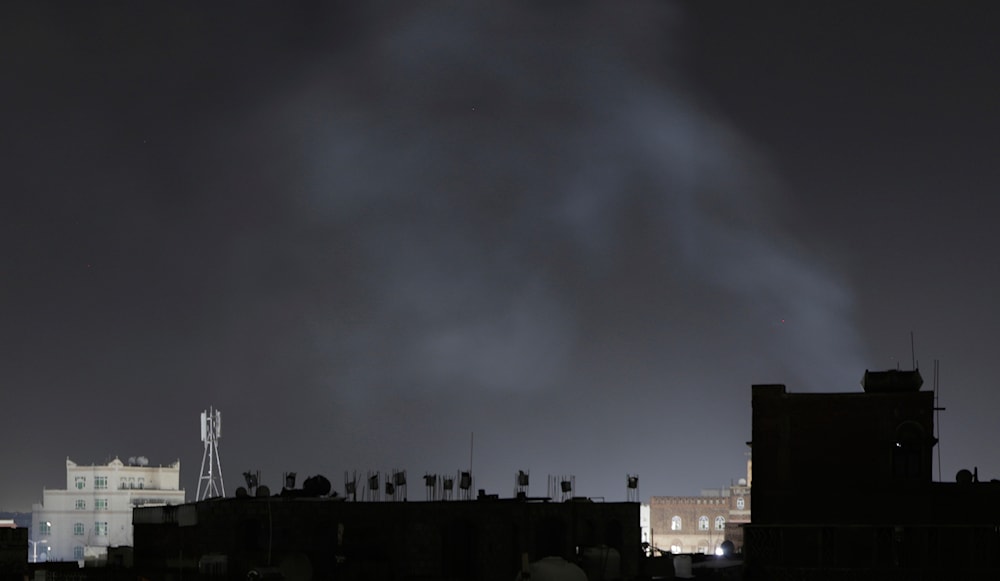How Signal leak saga overshadowed US attack on Yemeni civilian home
Reports reveal that despite US airstrikes aiming to curb YAF attacks, experts argue the Yemenis cannot be defeated by air power alone.
-

Smoke rises from a location reportedly struck by US airstrikes against Sanaa, Yemen, on Wednesday, March 26, 2025. (AP)
US Vice President Mike Waltz suggested that the US military destroy a civilian building to kill a Yemeni official allegedly present there, as exposed in the Signal group chat, a report by The Intercept on Thursday revealed.
Waltz wrote on Signal, "The first target — their top missile guy — we had positive ID of him walking into his girlfriend’s building, and it’s now collapsed."
Vice President JD Vance, who previously warned against bombing Yemen in the chat, replied to Waltz by saying, “Excellent.”
Top US security chiefs rejoice over airstrike that flattened residential building
The full Signal chat between Trump's top security chiefs showed that they celebrated the airstrike that flattened a residential building, which likely killed many civilians.
Other administration officials celebrated the destruction of the residential building, including Secretary of State Marco Rubio, White House Chief of Staff Susie Wiles, Deputy Chief of Staff Stephen Miller, US Middle Envoy Steve Witkoff, and Director of National Intelligence Tulsi Gabbard.
Gabbard previously opposed US intervention against Ansar Allah in Yemen, which she called “genocidal” during President Trump’s first term in office; however, she supported the new aggression on Yemen, which hasn’t been authorized by Congress, and replied to the news of the residential building being hit by saying, “Great works and effects!”
President Donald Trump began his aggression on Yemen earlier this month, after the YAF threatened to attack Israeli ships again over "Israel’s" blockade preventing aid from entering the Gaza Strip, killing tens of Yemeni civilians.
“Too often the news coverage of the Signal chat leak has lacked any real discussion of the actual act of war itself — the fact that the US is bombing people in Yemen,” Stephanie Savell, the director of the Costs of War Project at Brown University, told The Intercept.
“Fifty-three people have died in this latest wave of US airstrikes, five of them children. These are just the latest deaths in a long track record of US killing in Yemen, and the research shows that US airstrikes in many countries have a history of killing and traumatizing innocent civilians and wreaking havoc on people’s lives and livelihoods."
US airstrikes fail to deter YAF attacks on Red Sea shipping lanes
A report by The New York Times (NYT) revealed on Thursday that the US officials are working to reduce the Yemeni Armed Forces' (YAF) assaults on ships in the Red Sea, but experts argue that the airstrikes under Biden's administration haven't been effective in deterring the YAF and that the group cannot be defeated with air power alone.
According to the report, leaked messages from a group chat among Trump administration officials candidly disclosed the administration's objectives for the airstrikes carried out this month against the YAF.
However, some participants in the conversation stated that the airstrikes were intended to discourage the YAF from targeting commercial vessels in the Red Sea and to reopen shipping routes to the Suez Canal. However, these ambitious goals shared by senior officials in the Signal chat may not align with the reality on the ground.
'Defeating Houthis won't be easy'
Middle East experts, as cited by NYT, indicated that the YAF wouldn’t be easily defeated, noting that few wars have been won with air power alone, and military experts believe the same will apply to the Yemenis.
The report also noted that major shipping companies are hesitant to return to the Red Sea. They have instead opted for a different route, which, though inconvenient and costly, allows them to avoid the Red Sea lanes and still meet their delivery timelines.
The NYT report quoted James R. Holmes, the J.C. Wylie Chair of Maritime Strategy at the Naval War College in Rhode Island, who stated that even during the US war to expel Iraq from Kuwait in 1991, when air power was at its peak, a ground invasion was required — and "defeating the Houthis might require an occupation."
"You have to control turf to win," Holmes said, adding, "Aircraft cannot occupy territory, however valuable a supporting capability they are for armies and Marines."
According to the NYT, analysts suggest that the YAF may use the US military strikes to strengthen their position both in Yemen and beyond.

 4 Min Read
4 Min Read








